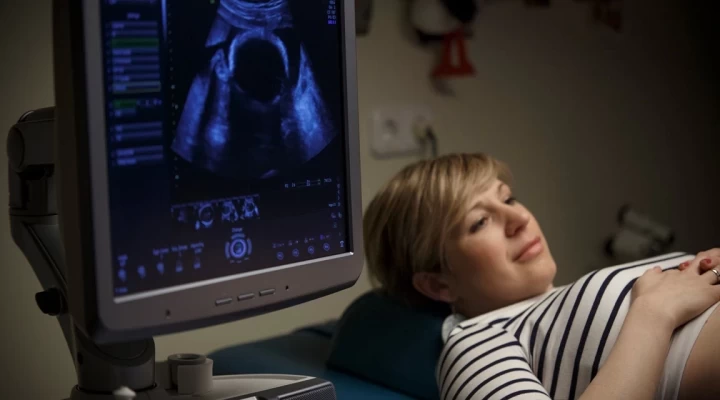Preeclampsia (PE) is a dangerous and common condition which can have serious consequences for both the expectant mother and the baby. At its summer congress, the Fetal Medicine Foundation presented its latest research* which has proven that treatment with aspirin reduces the risk of contracting preeclampsia. Taking into account the high risk of developing preeclampsia, the serious potential consequences and the possibility of evidence-based treatment, we have decided to add a test for preeclampsia to our first trimester screening.

What does preeclampsia mean?
Preeclampsia is sometimes also referred to as toxemia, pregnancy-induced hypertension or preeclamptic toxemia. It can present itself after the 20th week of pregnancy and can affect any expectant mother, usually without any prior warning. It is not yet known how or exactly what it develops from and when. It occurs in 2-5% of all pregnancies, and if it develops before the 34th week of pregnancy (0.3-0.5%) it can have serious and long-lasting consequences for both the mother and child.
Symptoms
- Sudden development of high blood pressure (140/90 mmHg and above)
- Presence of protein in urine
Why is the time it develops so important?
If severe preeclampsia develops, medically speaking the best way to resolve it is by inducing the birth of the child. Once the child is born, preeclampsia is eliminated, and this is why timing is so important. If preeclampsia develops before the 34th week of pregnancy, it means the baby will be born prematurely, which can often lead to problems: lack of growth, oxygen deficiency and complications due to premature labor. The presence of severe preeclampsia also brings serious dangers for the mother, with the possibility of kidney and liver failure, stroke and eclampsia.

How does the screening process work?
With the use of a cutting edge medical procedure, preeclampsia can now be detected with 90% accuracy in the 12th week of pregnancy. Based on the recommendation of the Fetal Medicine Foundation, during the screening test the blood pressure of the expectant mother is taken on both arms, while the flow rate of the uterine artery and the concentration of pregnancy-related proteins in the circulatory system are also measured. The expectant mother’s general medical history and body weight are also taken into account.
Prevention
According to the latest, very well grounded research*, if the screening shows that there is a high risk to the child, taking 150 mg of aspirin daily can be effective in preventing the development of early preeclampsia, defined as occurring before the 34th week, reducing the chances of its development by 80%. This treatment can be got without a prescription and is safe to take during pregnancy. A predecessor of aspirin, willow bark, was known and applied by the celebrated Greek doctor Hippocrates.
*Aspirin versus Placebo in Pregnancies at High Risk for Preterm Preeclampsia
28 June 2017, The New England Journal of Medicine
Daniel L. Rolnik, M.D., David Wright, Ph.D., Liona C. Poon, M.D., Neil O’Gorman, M.D.,
Argyro Syngelaki, Ph.D., Catalina de Paco Matallana, M.D., Ranjit Akolekar, M.D.,
Simona Cicero, M.D., Deepa Janga, M.D., Mandeep Singh, M.D., Francisca S. Molina,
M.D., Nicola Persico, M.D., Jacques C. Jani, M.D., Walter Plasencia, M.D., George
Papaioannou, M.D., Kinneret Tenenbaum-Gavish, M.D., Hamutal Meiri, Ph.D.,
Sveinbjorn Gizurarson, Ph.D., Kate Maclagan, Ph.D., and Kypros H. Nicolaides, M.D.




